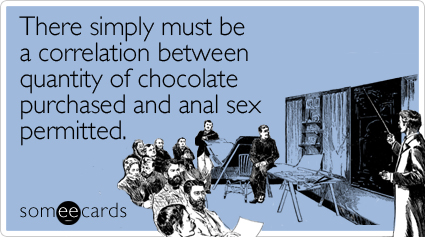I was on Youtube and encountered this video:
http://www.youtube.com/watch?v=qMRDLCR8vAE
It has an interesting discussion of how certain foods are paired with specific genders. Check it out!
Thursday, June 6, 2013
Wednesday, June 5, 2013
I see a lot of these funny ecards on social media sites online and happened to look into a few relating to our groups presentation of chocolate. Most of the ecards I just found funny, or they show the relationship chocolate has to sex, valentines day, love, indulgence, and women. This first image is piggy backing off of Evan's post about chocolate being related to the divine or "god like."




















Speaking of Hooters...
So a friend of mine on Instagram checked in to Hooters today, and she posted this picture of a sign inside the restaurant.
It clearly shows the different treatment of males and women, relating to their bodies.
Tuesday, June 4, 2013
O'Hara's in Westwood--Just Like Hooters?
Hey guys,
I came across this video that has to do with the Burger and Boobs group's presentation. Basically, a female bartender at O'Hara's, the local bar in Westwood, is suing the bar for the inappropriate dress code, fans that would blow the female's skirts and expose them, and other policies in the bar. The reporter says that the O'Hara's policies were established to boost sales.
I think this shows another example about how the industry caters to men, allowing not only to consume food and drinks but also their bodies--to make money. Sex sells. Also, I felt that the example of Hooters feels far removed from UCLA and the students here. However, it's clear that the objectification of women can hit very close to home.
http://www.cnn.com/video/data/2.0/video/us/2012/06/27/dnt-bartender-sues-over-skimpy-skirts.kcal.html
I came across this video that has to do with the Burger and Boobs group's presentation. Basically, a female bartender at O'Hara's, the local bar in Westwood, is suing the bar for the inappropriate dress code, fans that would blow the female's skirts and expose them, and other policies in the bar. The reporter says that the O'Hara's policies were established to boost sales.
I think this shows another example about how the industry caters to men, allowing not only to consume food and drinks but also their bodies--to make money. Sex sells. Also, I felt that the example of Hooters feels far removed from UCLA and the students here. However, it's clear that the objectification of women can hit very close to home.
http://www.cnn.com/video/data/2.0/video/us/2012/06/27/dnt-bartender-sues-over-skimpy-skirts.kcal.html
http://www.naturalnews.com/038092_hot_chocolate_superfood_health_benefits.html
This article further expands on the health benefits of Chocolate. However, the main reason I was
drawn to this article for was due to the wording that the author chose to use throughout the whole article.
The wording was sensual or very lofty and praising chocolate as divine and godlike. It is praising
addiction to chocolate as a sign taht your body knows when something is "good". "The Heavenly Elixir"
title for one of the sections also further emphasizes the use of chocolate as a link to the divine.
Also, the recipe sounds absolutely delicious.
Sunday, June 2, 2013
The Impossible Decision
I came across this article in The New Yorker about going to graduate school for English or Comparative Literature, and it immediately reminded me of Duncan, Fischer and Trevor in The Edible Woman and the class, because we are taking Comparative Literature -although only at the undergraduate level.
In short, the author, Joshua Rothman, starts by writing about how graduate school is a "bad idea in the long run." He does this very interestingly by quoting a hedge fund friend who responded with the following statistics when asked if postgraduate studies in English or Comparative Literature is worth it:
"... focus on the “base rates”: that is, on the numbers that give you a broad statistical picture of outcomes from graduate school in the humanities. What percentage of graduate students end up with tenure? (About one in four.) How much more unhappy are graduate students than other people? (About fifty-four per cent of graduate students report feeling so depressed they have “a hard time functioning,” as opposed to ten per cent of the general population.) If you take a broader view of the profession, it seems like a terrible idea to go to graduate school."
The "depression and hard time functioning" part of his spiel here really reminded me of Duncan and his rant about how things in graduate school get "more and more stale" and how he could not write more than a sentence a day (102).
Although it might seem as if one should be completely put off by the idea of attending graduate school in the humanities here and that Duncan is right, Rothman also brings forth the upsides of attending graduate school based on his own experience, which needless to say, is as, if not more, compelling than the cons of attending.
Granted, the article is not directly related to the theme and content of the class, but I still found it quite an intriguing, lighthearted and somewhat ironic read and thought it worth sharing, especially after seeing the minute connection to The Edible Woman.
P.S. Approach the article with a pinch or two (or even three) of salt and don't use it to analyze your own situation or let it deter you from applying!
P.P.S. I do not think it is a "terrible idea to go to graduate school" at all.
In short, the author, Joshua Rothman, starts by writing about how graduate school is a "bad idea in the long run." He does this very interestingly by quoting a hedge fund friend who responded with the following statistics when asked if postgraduate studies in English or Comparative Literature is worth it:
"... focus on the “base rates”: that is, on the numbers that give you a broad statistical picture of outcomes from graduate school in the humanities. What percentage of graduate students end up with tenure? (About one in four.) How much more unhappy are graduate students than other people? (About fifty-four per cent of graduate students report feeling so depressed they have “a hard time functioning,” as opposed to ten per cent of the general population.) If you take a broader view of the profession, it seems like a terrible idea to go to graduate school."
The "depression and hard time functioning" part of his spiel here really reminded me of Duncan and his rant about how things in graduate school get "more and more stale" and how he could not write more than a sentence a day (102).
Although it might seem as if one should be completely put off by the idea of attending graduate school in the humanities here and that Duncan is right, Rothman also brings forth the upsides of attending graduate school based on his own experience, which needless to say, is as, if not more, compelling than the cons of attending.
Granted, the article is not directly related to the theme and content of the class, but I still found it quite an intriguing, lighthearted and somewhat ironic read and thought it worth sharing, especially after seeing the minute connection to The Edible Woman.
P.S. Approach the article with a pinch or two (or even three) of salt and don't use it to analyze your own situation or let it deter you from applying!
P.P.S. I do not think it is a "terrible idea to go to graduate school" at all.
Subscribe to:
Posts (Atom)









